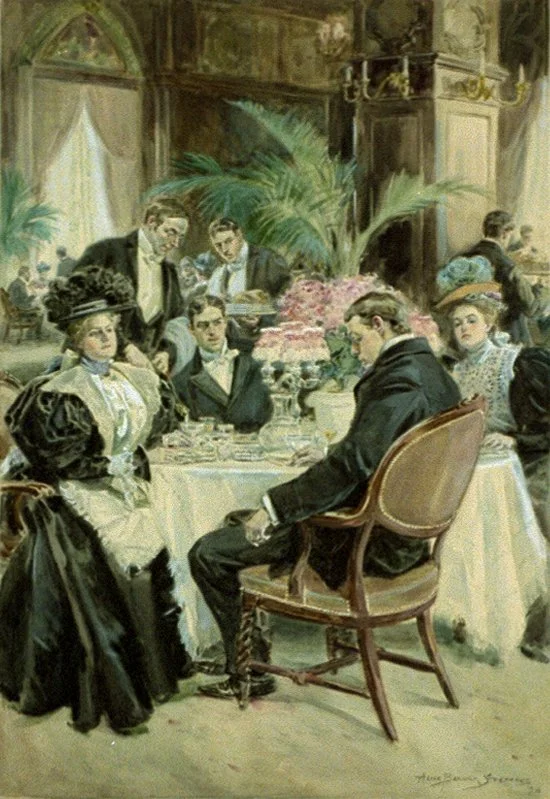Thanksgiving Day
The Collected Works of Ambrose Bierce Volume IX: Tangential Views
Ambrose Bierce
1911
Over-indulgence—a spoiled Thanksgiving (1896) by Alice Barber Stephens
There be those whose memories though vexed with a rake would yield no matter for gratitude.
With a waistcoat fitted to the occasion, it is easy enough to eat one’s allowance of turkey and hide away one’s dishonest share of the wine; if this be returning thanks, why, then, gratitude is considerably easier, and vastly more agreeable, than “falling off a log,” and may be acquired in one easy lesson. But if more than this be required—if to be grateful is more than merely to be gluttonous, your true philosopher (he of the austere brow upon which logic has stamped its eternal impress, and from whose heart sentiment has been banished along with other vestigial vices) will think twice and again before leveling his serviceable shins in humble observance of the day.
For here is the nut of reason that he is compelled to crack for the kernel of emotion appropriate to the rite. Unless the blessings that we think we enjoy are favors of the Omnipotent, to be grateful is to be absurd. If they are, then, also, the evils with which we are indubitably afflicted have the same origin. Grant this, as you must, and you make an offset of the ill against the good, or are driven either to the untenable position that we should be grateful for both, or the no more defensible one that all evils are blessings in disguise.
Truth is, my fine fellow of the distensible weskit, your annual gratitude is a sorry pretense, a veritable sham, a cloak, dear man, to cover your unhandsome gluttony; and when by chance you actually do take to your knees on one day in the year it is for physical relief and readier digestion of your bird. Nevertheless, there is truly a subtle but significant relation between the stuffing of the flesh and the gratitude of the spirit, as you shall see.
I have ever held and taught the identity of Stomach and Soul—one entity considered under two aspects. Gratitude I believe to be a kind of imponderable ether evolved, mainly, from the action of the gastric fluid upon rich provend and comforting tope. Like other gases it ascends, and so passes out at mouth, audible, intelligible, gracious. This beautiful theory has been tested by convincing experiment in the manner scientific, as here related.
Experiment I. A quantity of grass was put into a leathern bottle and a gill of the gastric fluid of a sheep introduced. In ten minutes the neck of the bottle emitted a contented bleat.
Experiment II. A pound of beef was substituted for the grass and the fluid of a dog for that of the sheep. The result was a cheerful bark, accompanied by agitation of the bottom of the bottle, as if an attempt were making to wag it.
Experiment III. The bottle was charged with a handful of chopped turkey, a glass of old port, and four ounces of human gastric fluid obtained from a coroner. At first nothing escaped from the neck but a deep sigh of satisfaction, followed by a grunt like that of a banqueting pig. The proportion of turkey being increased and the gas confined, the bottle was greatly distended, appearing to suffer a slight uneasiness. The restriction being removed, the experimenter had the happiness to hear, distinctly articulated, the words: “Praise God, from whom all blessings flow—praise Him all bottles here below!”
Against such demonstration as this all theological interpretation of the phenomena of gratitude is of no avail.
1869.


